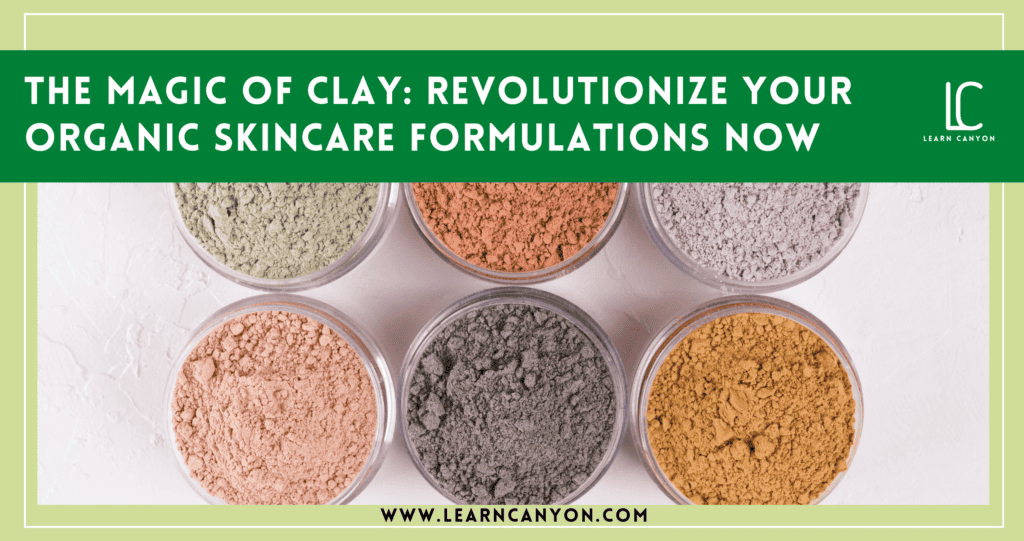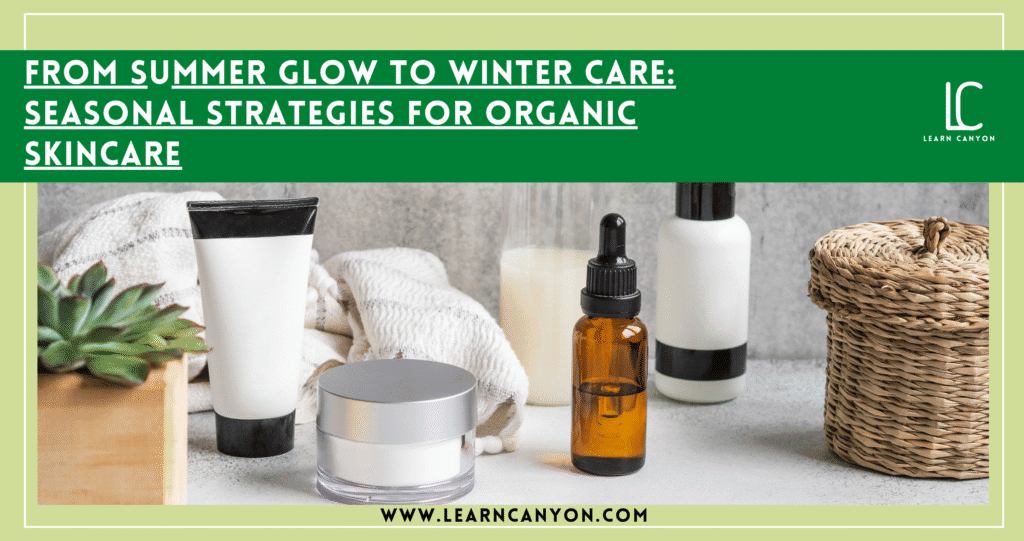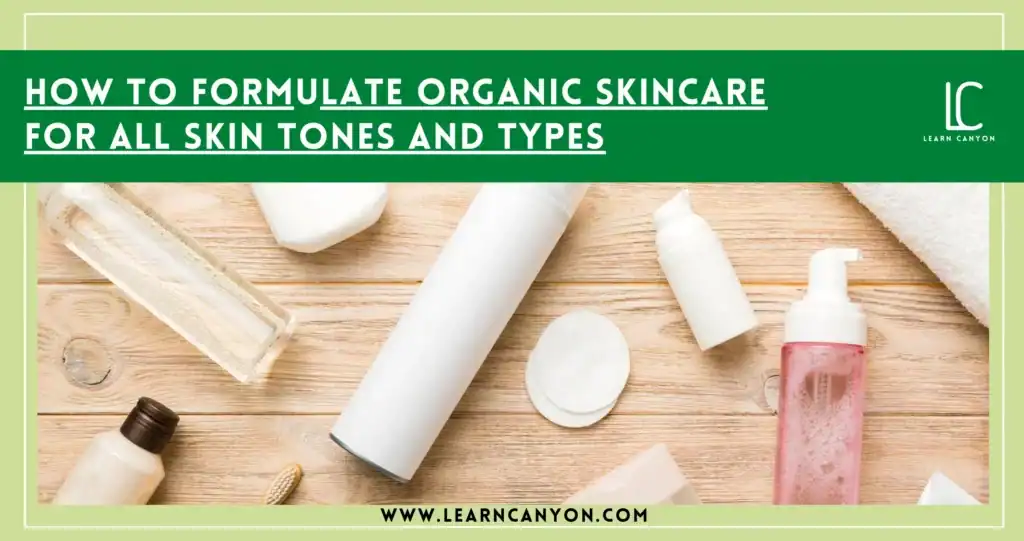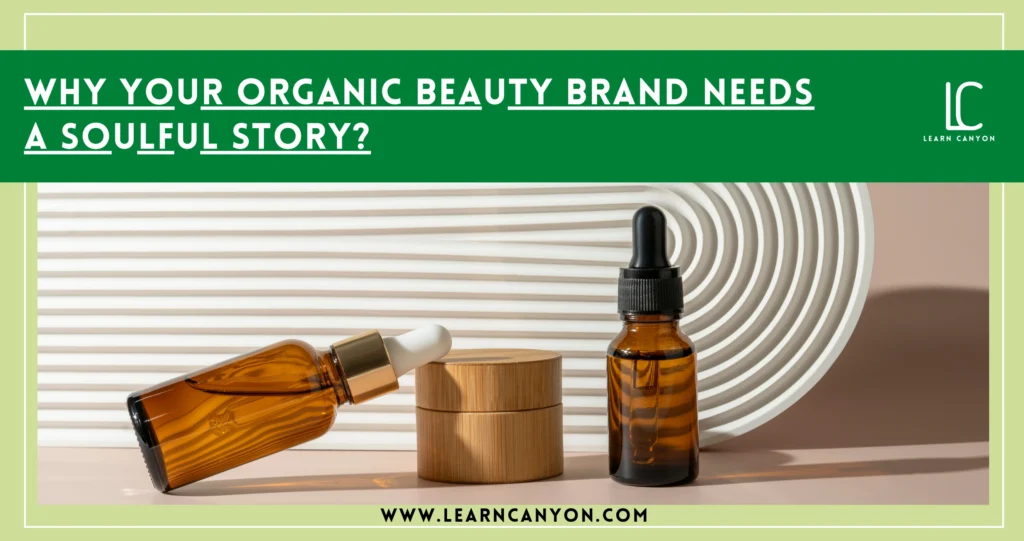I’ve had the pleasure of working with a huge variety of ingredients throughout my career as a professional formulator. I’ve seen everything, from rare botanical extracts to strong active ingredients.
But there is one substance clay in skincare whose adaptability and effectiveness never cease to astound me. Today, I want to tell you about the power of clay and how it can transform the formulations you use for natural skincare products.
I can still clearly recall the moment I discovered the benefits of clay for skincare. I was at a workshop on natural ingredients when the speaker kept gushing about clay’s benefits.
I was intrigued and decided to test it out in my own formulations; the results astound me. My skin appeared more radiant, felt softer, and just seemed overall healthier.
Since then, I’ve changed my mind about clay, using it in a variety of formulations and personally experiencing its amazing advantages.
So I invite you to join me on this exploration of the remarkable world of clay in skincare, whether you’re a new formulator just beginning your journey or an experienced formulator looking to explore new ingredients.
Get ready to transform your formulations like never before as you learn the secrets of this modest yet potent ingredient!
Understanding Clay in Skincare
Let’s first understand what clay is and why it’s such a prized component in skincare before delving deeper into its wonders. In its most basic form, clay can be defined as a naturally occurring mineral-based substance.
It contains high concentrations of silica, magnesium, calcium, and zinc, all of which are vital for maintaining healthy skin.
Now, not every type of clay is the same. There are various kinds of clay, and each has special qualities and advantages.
- For instance, bentonite clay is renowned for its effective detoxifying abilities. It is a common ingredient for face masks and other detoxifying skincare products because it is made from volcanic ash and has a special capacity to draw impurities from the skin.
- On the other hand, kaolin clay is incredibly gentle and ideal for skin types with sensitive characteristics. It works wonders at gently exfoliating the skin and removing dead skin cells without irritating it.
- French Green clay is well known for its pore-tightening and toning properties. Iron oxides and decayed plant matter, primarily seaweed and algae, are what give it its green colour and provide it with healthy minerals and antioxidants.
- Magnesium and silica are abundant in rhassoul clay, which is derived from the Moroccan Atlas Mountains. It is a well-liked ingredient in skincare products for oily and acne-prone skin because of its reputation for drawing excess oil and impurities from the skin.
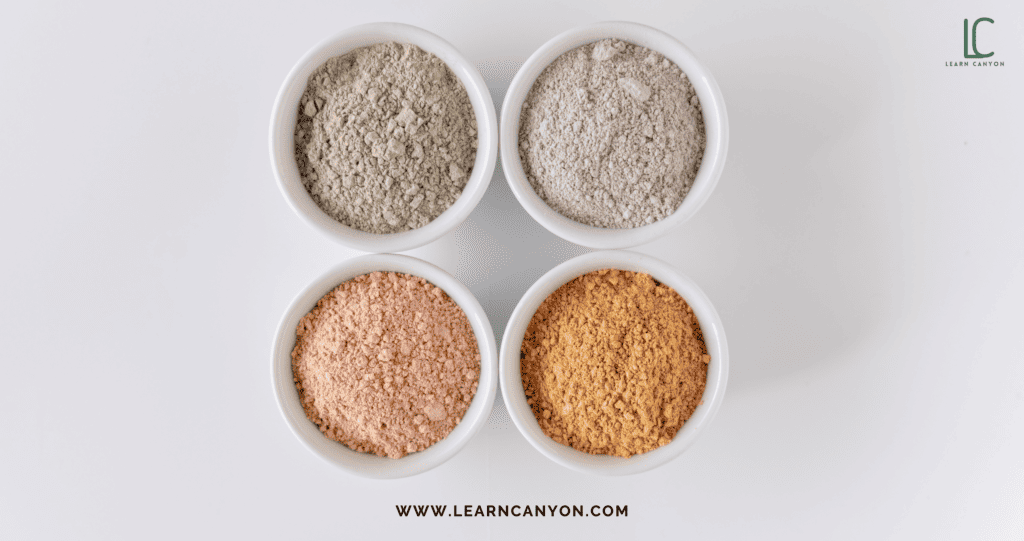
Do you recall the first time I used rhassoul clay to create a mask? I recently received a sample of this unusual clay from a supplier as I was developing a new line for people with oily skin. I made the decision to give it a shot, and the product testing results were fantastic! Customers praised the way it cleaned and refreshed their skin without overdrying it. Rhassoul clay quickly established itself in my formulations for oily skin as a clear winner.
There is a type of clay for almost every skin issue, as you can see. Understanding the special qualities of each clay and knowing how to use them in your formulations are key.
Kaolin Clay: A Wonder Exfoliant To Oily Skin
Clay: The Detoxifying Powerhouse
Clay’s amazing detoxifying abilities are one of its most intriguing features. A variety of clays, including bentonite and rhassoul, have a distinctive electrical charge that is “negative.” This charge enables them to draw out toxins, impurities, and heavy metals from the skin by binding and attracting with “positive” charged substances.
Clay is a potent ingredient in deep-cleansing and detoxifying formulations because it attracts dirt and grime like a magnet.
I can remember a time when I was creating an organic face mask that detoxified the skin. I had an idea for a product that would deeply cleanse our skin by removing the dirt and pollutants that it is constantly exposed to. I made the choice to highlight Bentonite clay as the main component.
I recall that the initial stages of the formulation process were somewhat difficult. It took several iterations to find the ideal consistency—one that was neither too thick to be difficult to apply nor too runny to drip off the face—because bentonite clay can make a formulation quite thick. After many late nights and numerous coffees, I at last succeeded.
The first time I used the finished product on my skin, it felt incredibly reviving. I almost felt as though it was drawing the dirt out of my pores as it dried. My skin felt incredibly clean and detoxified after I rinsed it off. The item was well received by our test consumers and quickly rose to the top of our best-seller list when it was released.
I was really convinced by that experience of how effective clay can be in formulas for detoxifying skincare. It’s an ingredient that really lives up to its promise, giving clients observable outcomes they can feel and see.
Clay: The Natural Exfoliator
In along with its ability to detoxify, clay is a great all-natural exfoliator. The skin’s surface is gently scrubbed by its tiny particles, which also remove dead skin cells, exposing a smoother, more radiant complexion underneath. The best part, though? It accomplishes this without the harshness frequently associated with abrasive scrubs or chemical exfoliants.
Particularly Kaolin clay is renowned for its mild exfoliating qualities. When I was creating a daily cleanser for people with sensitive skin, I recalled needing an ingredient that would gently exfoliate without irritating the skin. It suited Kaolin clay perfectly.
I can still clearly remember when I got the first review from a user of this cleanser. She had trouble using exfoliators because they either didn’t work well enough for her sensitive skin or were too harsh for it. But she claimed that this cleanser was a game-changer. It didn’t cause any redness or irritation, just a soft, smooth feeling on her skin. She was ecstatic, and I was once more reminded of the strength of clay.
So, when you’re looking to give your formulations a little extra exfoliating power, think about clay. It’s the ideal gentle but powerful substitute for traditional exfoliants for skincare users who want a smoother complexion without the risk of sensitivity.
Clay: The Miracle Moisture Balancer
Clay also has the amazing ability to balance the moisture levels of skin. Given that clay is frequently linked to having oil-absorbing and detoxifying properties, this might seem surprising. But this is part of the magic of clay; while it can help dry skin retain moisture, it can also absorb extra oil from oily skin types.
When I was experimenting with formulations for combination skin, I came across this balancing act. I was looking for a skin care ingredient that could treat both oily and dry skin. I started using clay at that point, specifically French Green clay.
French Green clay is renowned for its exceptional capacity to control sebum production. It helps the skin retain moisture naturally in drier areas while absorbing excess oil where it is needed. I chose to incorporate it into a facial mask in the hopes that it would provide the balance I was seeking.
I can still feel the excitement I felt when using the mask for the first time. On my skin, it felt soothing, and as it dried, I could see that it was acting differently on different parts of my face. The areas that were drier felt loose and comfortable while the oilier portions appeared matted.
My skin felt balanced after washing it off—not too dry or oily, just right. The test group’s feedback confirmed my observations. When formulating for difficult skin types, don’t forget about clay. the mask quickly became a go-to for people with combination skin, demonstrating once more what a true wonder it is. It might be the moisture balancer miracle you’ve been looking for.
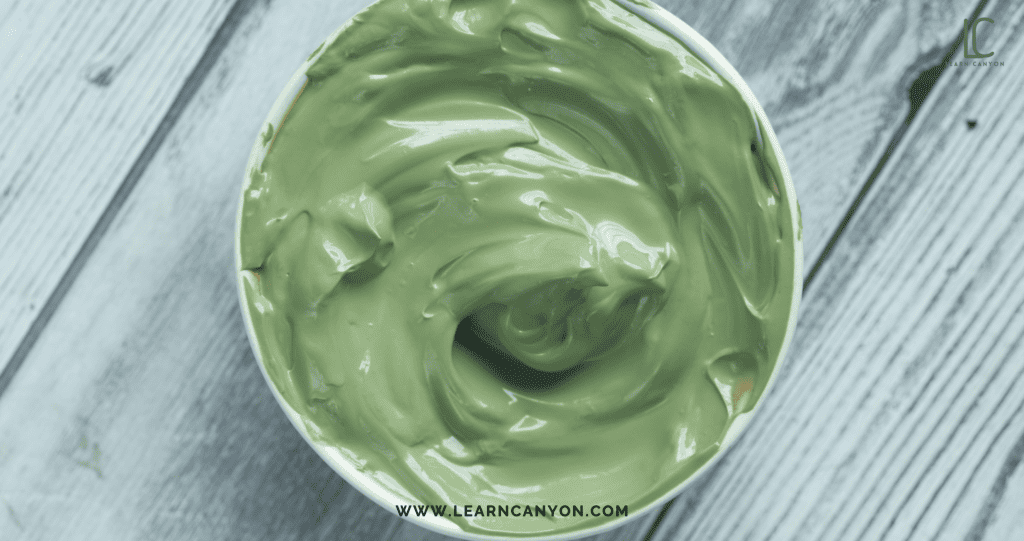
Clay: The Soothing Sensation
Clay is renowned for its calming and soothing qualities in addition to all of its other amazing advantages. It has been used for centuries to heal wounds, lessen inflammation, and soothe skin irritations. This makes it a particularly useful ingredient for skin types that are reactive, sensitive, or prone to acne.
For instance, Kaolin clay can calm redness and soothe irritated skin due to its gentle nature and rich mineral content. It was a crucial component of the soothing mask for reactive skin types, which was one of the most rewarding formulations I’ve ever worked on.
This project was especially dear to my heart because it was motivated by a friend who suffered from reactive skin. She was constantly searching for products to soothe and calm her skin during these episodes because her skin would frequently flare up without warning. I therefore made the decision to develop a formulation specifically for her.
With other gentle, skin-soothing ingredients like aloe vera and chamomile extract, I chose Kaolin clay for its calming and soothing qualities. I will never forget how she reacted when she first put the mask on. She described it as a “comfort blanket for her skin,” helping to lessen the redness and leaving her skin feeling calm and cosy.
So, the next time you’re formulating for sensitive or reactive skin types, consider incorporating clay. Its soothing and calming properties could be just what your product needs to provide that much-needed relief to your customers’ skin.
Innovative Formulation with Clay
After exploring the many advantages clay has for skincare formulations, let’s talk about how to use clay in formulations. Due to its nature, clay can be a little difficult to work with. If not properly formulated, it can dry out formulations and has a tendency to thicken them. But don’t worry, you can overcome these obstacles and produce unique, useful clay-based products with a little knowledge and imagination.
One of the most important factors to take into account when adding clay to formulations is consistency. Clay has the ability to thicken your formulations, which is great for masks but not so great for other product types. To get the desired consistency, you might need to experiment with different ratios and perhaps add additional ingredients.
A clay-infused serum was one of my clay-based formulations that was most inventive. This was a difficult project because, because of its thickening properties, clay is not frequently used in serum formulations. But I was determined to develop a lightweight, quickly-absorbing serum that tapped into clay’s natural detoxifying abilities.
I finally succeeded in developing a formula that combined hydrating and soothing ingredients with a small amount of clay after much trial and error. The end result was a special serum that provided clay’s advantages without the weight that clay products are typically known for. It was well-liked by our customers, demonstrating that clay can be used to make a wide range of products with a little imagination.
Don’t be afraid to get creative with clay in your formulations. While it can be a bit challenging to work with at times, the benefits it brings to your products make it well worth the effort.
Embrace the Magic of Clay
As we’ve seen, clay is a truly miraculous component in skincare formulas. It balances, soothes, exfoliates, detoxifies, and does so much more. It’s an ingredient that speaks to the strength of nature and serves as a reminder that sometimes the best answers are right under our feet.
I’ve personally experienced clay’s transformative power in my formulations, and I urge you to do the same in yours. There is a type of clay that is ideal for your formulation, whether you’re creating a deep-cleansing mask, a gentle exfoliating cleanser, or an inventive clay-infused serum.
Just keep in mind to consider the unique characteristics of the various types of clay and to welcome the formulation difficulties that come with it. After all, formulating’s magic lies not only in producing successful products but also in overcoming obstacles and opening up new opportunities along the way.
It’s time to get our hands dirty, explore the world of clay, and watch as its magic transforms our formulations, my fellow formulators. The process will be thrilling, the outcomes satisfying, and our products will benefit greatly from it. Together, let’s embrace the magic of clay!
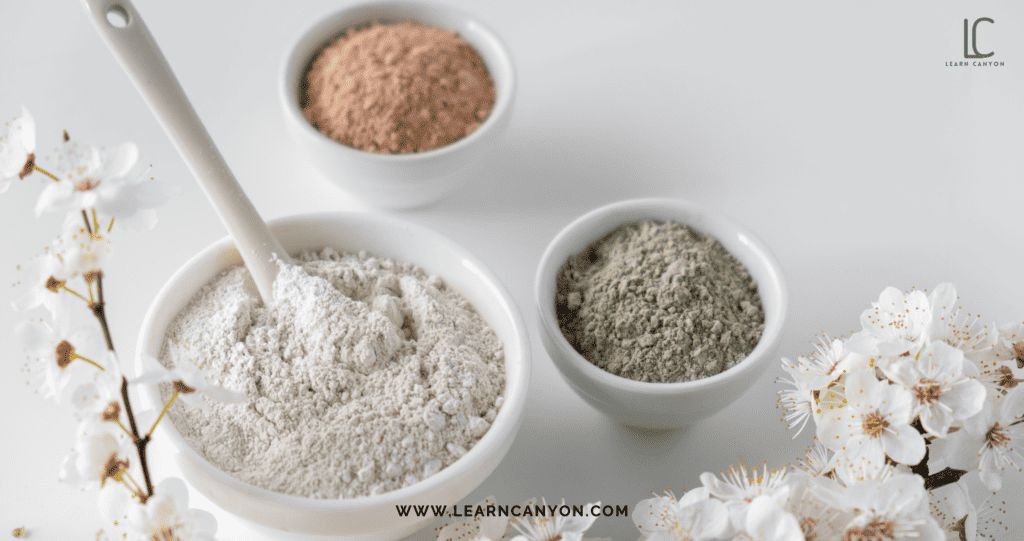
Key Takeaways and Next Steps
Let’s go over some important lessons learned as we draw to a close our exploration of the world of clay:
- Understand the Different Types of Clay: Bentonite, Kaolin, French Green, and Rhassoul are just a few examples, each with unique properties and benefits for the skin. Choose the one that best aligns with your formulation’s goal.
- Embrace the Many Benefits of Clay: Clay can detoxify, exfoliate, balance moisture, and soothe skin. It’s a versatile ingredient that can address various skin concerns.
- Get Creative with Your Formulations: Don’t let the challenges of formulating with clay deter you. Embrace the journey of discovery and innovation.
Your next steps? Start experimenting!
Choose the type of clay that can best address the skin issues you want your product to address after giving those issues some thought. Always keep in mind that balance is key. Clay has a lot of power, but you don’t want it to dominate your formulation.
Don’t forget to relish the procedure, too. Making a product from scratch can be incredibly satisfying, especially when you are aware of the advantages it will have for your customers’ skin.
So here’s to our upcoming formulation journey. I hope it’s just as thrilling and rewarding as the last one. Everyone have a great time creating!




